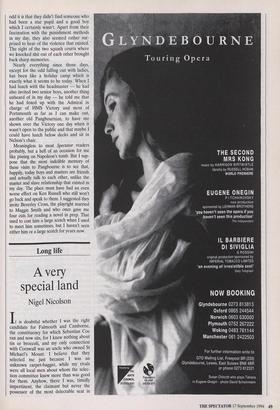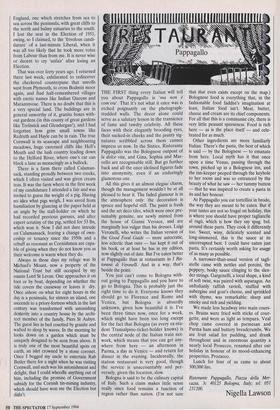Long life
A very special land
Nigel Nicolson
It is doubtful whether I was the right candidate for Falmouth and Camborne, the constituency for which Sebastian Coe ran and now sits, for I knew nothing about tin or broccoli, and my only connection with Cornwall was an uncle who owned St Michael's Mount. I believe that they selected me just because I was an unknown carpet-bagger, while my rivals were all local men about whom the selec- tion committee knew more than was good for them. Anyhow, there I was, timidly impertinent, the claimant but never the possessor of the most delectable seat in England, one which stretches from sea to sea across the peninsula, with great cliffs to the north and balmy estuaries to the south. I lost the seat in the Election of 1951, owing, so I claimed, to the 'frivolous candi- dature' of a last-minute Liberal, when it was all too likely that he took more votes from Labour than from me. It is never wise or decent to cry 'unfair' after losing an Election.
That was over forty years ago. I returned there last week, exhilarated to rediscover the checkered counterpane that unrolls west from Plymouth, to cross Bodmin moor again, and find half-remembered villages with exotic names like Indian Queens and Marazonvose. There is no doubt that this is a very special land. The buildings are in general unworthy of it, granite boxes with- out gardens (in this county of great gardens like Trelissick and Glendurgan!), and I had forgotten how grim small towns like Redruth and Hayle can be in rain. The true Cornwall is its seascape and neighbouring meadows, huge caverned cliffs like Hell's Mouth and the lush country leading down to the Helford River, where one's car can block a lane as menacingly as a bullock.
There is a farm there called Calaman- sack, standing proudly between two creeks, which I often visited and was given cream teas. It was the farm where in the first week of my candidature I attended a fair and was invited to guess the weight of a pig. Having no idea what pigs weigh, I was saved from humiliation by glancing at the paper held at an angle by the stall-holder on which he had recorded previous guesses, and after expert scrutiny of the pig, settled for 53 Ibs, which won it. Now I did not dare intrude on Calamansack, fearing a change of own- ership or tenancy since the 1950s and a rebuff as resonant as Cornishmen are capa- ble of giving when they do not know you as their welcome is warm when they do.
Always in those days my refuge was St Michael's Mount, now a property of the National Trust but still occupied by my cousin Lord St Levan. One approaches it on foot or by boat, depending on whether the tide covers the causeway or leaves it dry. Once ashore on what for eight hours in the day is a peninsula, for sixteen an island, one asccends to a priory-fortress which in the last century was transformed with astonishing dexterity into a country house by the archi- tect member of the family, Piers St Aubyn. The guest lies in bed cosetted by granite and wafted to sleep by waves. In the morning he looks down on a garden which must be uniquely designed to be seen from above. It is truly one of the most beautiful spots on earth, an islet crowned by a stone coronet. Once I begged my uncle to entertain Rab Butler there for a night when he was visiting Cornwall, and such was his astonishment and delight, that I could wheedle anything out of him, including the promise of Government subsidy for the Cornish tin-mining industry, which should have won me the Election but didn't.



























































 Previous page
Previous page